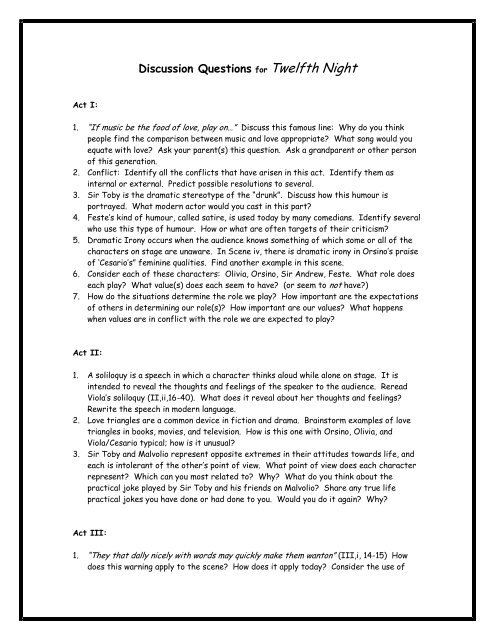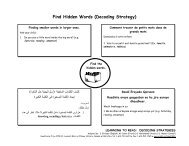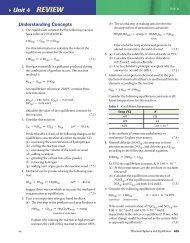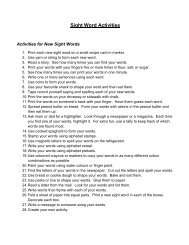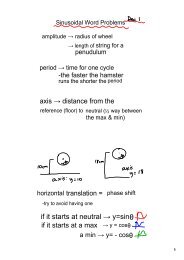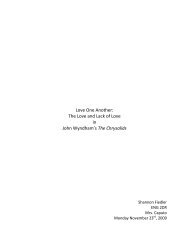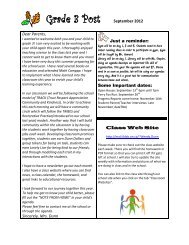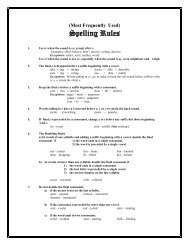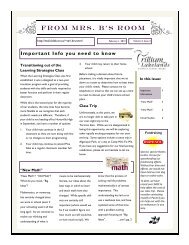Discussion Questions for Twelfth Night.pdf
Discussion Questions for Twelfth Night.pdf
Discussion Questions for Twelfth Night.pdf
Create successful ePaper yourself
Turn your PDF publications into a flip-book with our unique Google optimized e-Paper software.
Act I:<br />
<strong>Discussion</strong> <strong>Questions</strong> <strong>for</strong> <strong>Twelfth</strong> <strong>Night</strong><br />
1. “If music be the food of love, play on…” Discuss this famous line: Why do you think<br />
people find the comparison between music and love appropriate? What song would you<br />
equate with love? Ask your parent(s) this question. Ask a grandparent or other person<br />
of this generation.<br />
2. Conflict: Identify all the conflicts that have arisen in this act. Identify them as<br />
internal or external. Predict possible resolutions to several.<br />
3. Sir Toby is the dramatic stereotype of the “drunk”. Discuss how this humour is<br />
portrayed. What modern actor would you cast in this part?<br />
4. Feste‟s kind of humour, called satire, is used today by many comedians. Identify several<br />
who use this type of humour. How or what are often targets of their criticism?<br />
5. Dramatic Irony occurs when the audience knows something of which some or all of the<br />
characters on stage are unaware. In Scene iv, there is dramatic irony in Orsino‟s praise<br />
of „Cesario‟s” feminine qualities. Find another example in this scene.<br />
6. Consider each of these characters: Olivia, Orsino, Sir Andrew, Feste. What role does<br />
each play? What value(s) does each seem to have? (or seem to not have?)<br />
7. How do the situations determine the role we play? How important are the expectations<br />
of others in determining our role(s)? How important are our values? What happens<br />
when values are in conflict with the role we are expected to play?<br />
Act II:<br />
1. A soliloquy is a speech in which a character thinks aloud while alone on stage. It is<br />
intended to reveal the thoughts and feelings of the speaker to the audience. Reread<br />
Viola‟s soliloquy (II,ii,16-40). What does it reveal about her thoughts and feelings?<br />
Rewrite the speech in modern language.<br />
2. Love triangles are a common device in fiction and drama. Brainstorm examples of love<br />
triangles in books, movies, and television. How is this one with Orsino, Olivia, and<br />
Viola/Cesario typical; how is it unusual?<br />
3. Sir Toby and Malvolio represent opposite extremes in their attitudes towards life, and<br />
each is intolerant of the other‟s point of view. What point of view does each character<br />
represent? Which can you most related to? Why? What do you think about the<br />
practical joke played by Sir Toby and his friends on Malvolio? Share any true life<br />
practical jokes you have done or had done to you. Would you do it again? Why?<br />
Act III:<br />
1. “They that dally nicely with words may quickly make them wanton” (III,i, 14-15) How<br />
does this warning apply to the scene? How does it apply today? Consider the use of
words by politicians and advertisers. Pitch this play to a specific target audience using<br />
words which would appeal to the values and prejudices of that audience.<br />
2.<br />
“We cannot fight <strong>for</strong> love, as men may do;<br />
We should be woo‟d and were not made to woo.”<br />
Olivia clearly rejects this convention of her times. What do you think about the<br />
traditional roles of males and females in dating and courtship. Compare them to your<br />
generation. How do they compare with that of the generation be<strong>for</strong>e. What changes<br />
are <strong>for</strong> the better? What changes you would like to see made now?<br />
3. Toby claims that “report of valour” or an act of bravery is the best way <strong>for</strong> a man to<br />
impress a woman. Make a list <strong>for</strong> each of the following: What a woman looks <strong>for</strong> in a<br />
man; What a man looks <strong>for</strong> in a woman.<br />
4. How does Malvolio‟s soloquy (III,iv,62-81) reveal that he deceives himself as much as<br />
the others have deceived him?<br />
5. In Scene iv, Viola is <strong>for</strong>ced to defend her honour according to an unwritten code of male<br />
behavious. What values, attitudes and actions does this code require? What similar<br />
codes are there today <strong>for</strong> males/ For females? Would you change these if you could?<br />
How?<br />
6. Shakespeare uses both poetry and prose. Compare the dialogue between Viola and Olivia<br />
at the end of Scene i, and Sir Toby‟s speech (III, iv, 168-174). Discuss the subjects<br />
discussed, the mood, the audience‟s attitudes to the characters and Shakespeare‟s<br />
choice of words and images.<br />
Act IV:<br />
1. Disguises are common in Shakespeare‟s plays. Discuss the use of disguise in scene ii.<br />
What do you think is Shakespeare‟s purpose in disguising Feste?<br />
2. Feste‟s portrayal of a clergyman pokes fun at the assumed solemnity and pomposity of<br />
some churchmen. What other figures of authority or persons of importance are<br />
frequent targets of satire?<br />
3. Describe the character of Sebastian has he appears in scenes I and iii of this act.<br />
4. At this stage of the play, what are the chances <strong>for</strong> a happy ending? Consider the<br />
following: Sebastian‟s presence; Sebastian‟s character; Sir Toby‟s presence in Olivia‟s<br />
household; remaining problems to allow everyone to live “happily ever after”.<br />
Act V:<br />
1. Indignation, the feeling of being wronged or unjustly treated, is one of the strongest<br />
human emotions. What motivates Antonio‟s indignation in this scene? Orsino is another<br />
character who feels betrayed by someone close to him. Discuss his emotions, and which,<br />
if any, are justified? Sir Toby also expresses his sense of indignation? Why does he<br />
blame his injury on Sir Andrew? What does this reveal about him?<br />
2. “I‟ll be revenged upon the whole pack of you” How does Malvolio‟s promise introduce a<br />
“sour note” into the otherwise harmonious resolution of the play? Why do you think<br />
Shakespeare included this story line, with this conclusion?


